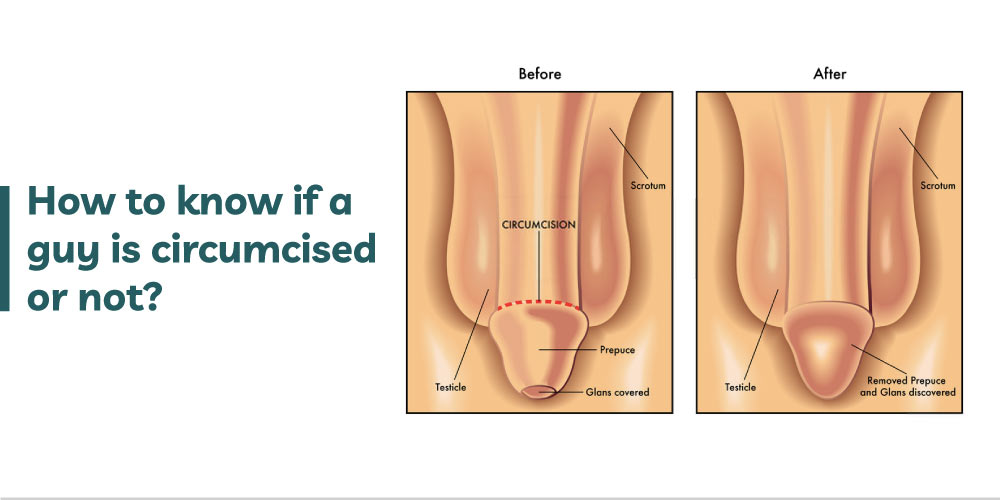Wondering how to know whether a guy is circumcised or not? If so, there are ways to know.
All males are born with a hood of skin that covers the head of the penis [glans]. This hood is called foreskin. Surgical removal of the foreskin is circumcision. Circumcision surgery is mostly performed in childhood as a religious or cultural ritual or for medical purposes. However, adult males can also get circumcised for aesthetic or medical reasons.aa
If the person is someone you know and you are comfortable having a conversation with, you can ask him directly whether he is circumcised or not. In case he is the guy with whom you have a sexual relationship or your boyfriend or husband, you may pay attention to their genital part [penis]. Because you can easily notice some physical signs on the penis, which can help you know whether he is circumcised or not.
One of the major signs of the circumcised penis is the absence of the foreskin. Due to this, the head of the penis [glans] in a circumcised male is always exposed when the penis is erect or non-erect. In the case of an uncircumcised penis, the foreskin is present and covers the head of a non-erect penis. And when the penis is erect, the foreskin pulls back and reveals the glans. Due to the presence of the foreskin, an uncircumcised penis may appear to be bulkier.
Sometimes there will be a color difference in the skin of the penis. This is because the part of the penis where the foreskin is removed will be lighter in color than the rest of the penis. This color difference can be easily noticed when you see the circumcised and uncircumcised penis. Also, you may see a scar at a short distance beneath the ridge of the glans in case of a circumcised penis.
One of the best urologists from circumcisiondoctors.com says – “Circumcised or not circumcised, either way, is normal and healthy. Several medical studies proved that getting circumcised has both pros and cons. Approximately 1 in 3 males around the globe are circumcised. And reasons for getting circumcised may vary from person to person.”
Circumcised vs uncircumcised penis:
Let’s see the differences between circumcised and uncircumcised penis.
Sexually transmitted diseases [STDs] like HIV may survive in the space between the foreskin and the penis. So, getting circumcised, removing the foreskin can lower the chances of getting STDs like the human immunodeficiency virus [HIV]. Also, several medical studies reported that circumcised males are less prone to developing urinary tract infections [UTIs] than uncircumcised males. Many medical researchers concluded that circumcised men are less likely to develop penile cancer than uncircumcised men.
Not only males but also female partners of circumcised males get benefited from circumcision surgery. Some medical studies found that the incidence of high-risk human papillomavirus [HPV] in female partners is reduced by 28%. Also, circumcision is shown to prevent bacterial vaginosis [BV] in females whose male partners are circumcised. As per a few studies, women whose male partners are not circumcised are more prone to cervical cancer than women whose male partners are circumcised.
If the penis is not cleaned well, sweat, dirt, and dead cells can accumulate under the foreskin leading to the buildup of a thick secretion called smegma, which looks yellow-white. The smegma can cause redness, inflammation, irritation, and swelling of the penis. So, keeping your penis clean and hygienic can reduce your chances of getting penile problems like balanitis. Circumcision makes it easy to clean the penis and can reduce the chances of developing foreskin and penile problems. In addition, circumcised teenagers or males may not require any extra hygienic care as they can wash the penis as a part of their bathing routine. In contrast, uncircumcised males need to make extra effort to clean the penis.
Few researchers proved that circumcision can improve or solve premature ejaculation for some men. However, the sexual drive remains the same for men who are circumcised and uncircumcised. Also, it is believed that circumcision can affect the natural ability to lubricate the penis during intercourse and masturbation.
Summary:
Many males undergo circumcision because of medical conditions, aesthetic purposes, cultural, religious, and personal reasons. Some scientific evidence has found circumcision in older males can carry a higher risk of complications, and the benefits of circumcision in newborn males outweigh the risks.
Circumcised males do not have a foreskin, and uncircumcised males do have a foreskin that covers the head of the penis. It’s your choice whether to get circumcised or not. So, before deciding to get circumcised, discuss with your doctor.


